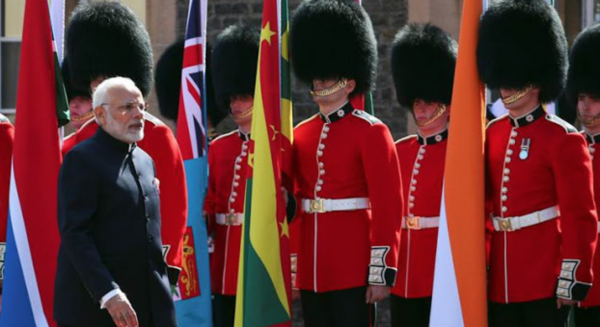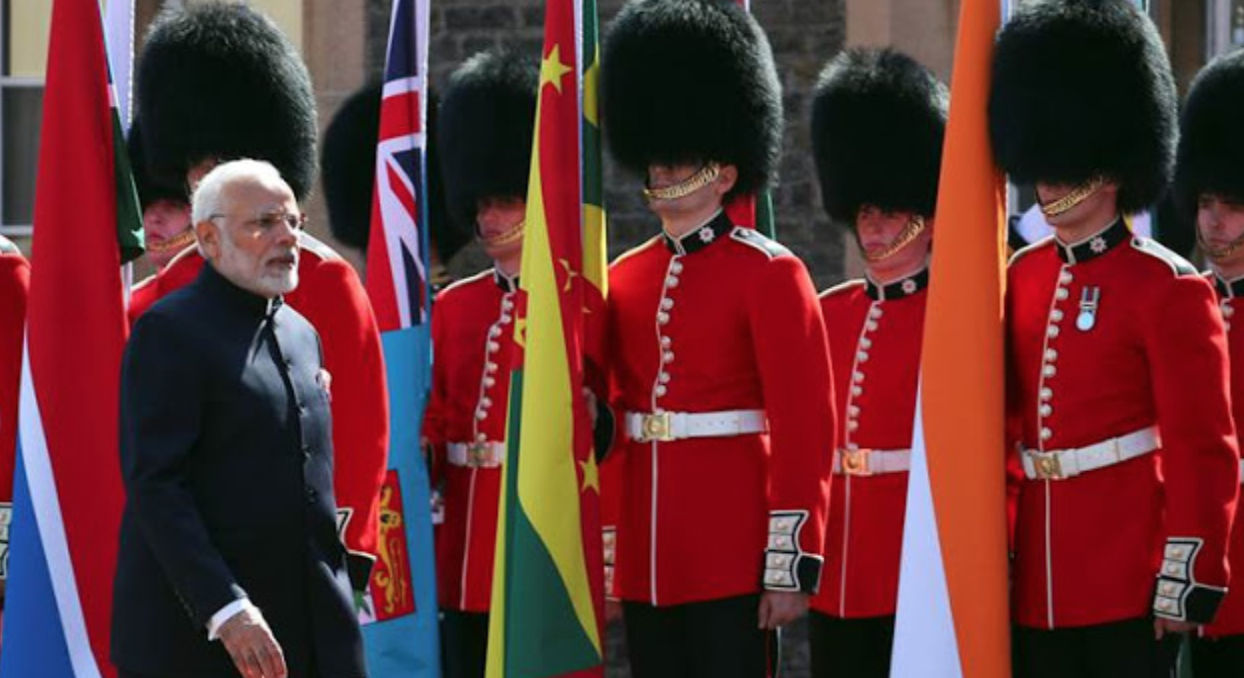
Slightly odd thought (which requires further development): The Commonwealth is at something of a crossroads at present, and understandably so. After all, it’s never truly made a ‘proper’ transition from a sort of vestigial “ashes of empire” into a properly multi-national bloc on any but a talking-shop level.
Something which is going to be rather interesting, though, is how the Commonwealth chooses to re-organize itself in light of the changed geopolitical realities of the 21st century – and in particular, which member-states [present .. or even, perhaps, future] are likely to emerge as both leaders *within* the Commonwealth sphere, as well as the incipient ‘axials’ around which the future structure and impetus of the Commonwealth are likely to gestate or gel.
For the time-being at least, British dominance of the whole thing seems an arguable fait accompli. This is particularly the case as a result of #Brexitplacing far more emphasis upon the imperative vitality of non-European foreign relations for the UK (something which, as I have capaciously argued previously, renders that particular development quite the win for us down here in New Zealand!).
Yet for an array of reasons, it seems very plausible to prophesy that this state of affairs will be unlikely to continue indefinitely.
Obviously, the ‘future shape’ of the Commonwealth, and the relative apportions or agglomerations of ‘power’ therein, will be significantly impacted by which principles and objectives the Commonwealth structure winds up prioritizing.
If it reconvens as a ‘trade-bloc’, then nations with considerable economic cloud will become more prominent, for instance. While if it (instead – it is always a bit iffy attempting to do this in harmony with economic motives) chooses to emphasize the nebulous notions of ‘shared values’, democracy, and Anglospheric conceptions of ‘human rights’ .. then the virtue-signalling states will undoubtedly have the most to say – whether or not anyone’s actually listening.
But while certain polities such as Canada and Australia look set to loom large in the Commonwealth’s future constellation of aspirations almost regardless of which direction it chooses to go, due to their reasonably sized populations and markets and the relative influence of their political systems … I found myself pondering an altogether different angle.
Namely whether, as what will undoubtedly be the single most significant state within the Commonwealth in almost any term one chooses to mention given sufficient time, whether we might actually see a most intriguing development of the Commonwealth pertaining to India.
It would, to be sure, be an ironic state of affairs to see the vestigial remnants of the empire which so iniquitously subjugated the Subcontinent in centuries previous … eventually evolve into a community of influence built around the emergent Great Power grown up in its wake. Although as Mark Twain (iirc) once allegedly observed – history doesn’t “repeat” so much as it “rhymes”.
Still, it would be a most interesting historical and geopolitical development; as while India has done stirling work at shoring up diplomatic ties in various parts of the world in recent years, its perceived ‘pivot’ away from Russia and accompanying improvement in relations with the Americans, has not necessarily significantly improved its relative power position given the increasing competitiveness the Chinese have displayed in both India’s own neighbourhood/friend-circles as well as the potential areas for Indian diplomatic expansion.
With all of this in mind, the Commonwealth represents as a potential natural ‘longer term’ avenue for drawing together a worthwhile array of economic and political partners for India, who also in many cases have pre-existing reasons to share important elements of the Indian geopolitical vision RE Her northern neighbour.
There are some putative ‘sticking points’, of course. For one thing, Pakistan retains its Commonwealth membership. For another, following this month’s CHOGM meeting, Prince Charles looks set to continue the Royalist tradition of an unelected (sort-of) English sovereign presiding over the organization.
Yet who knows how things may differ in twenty to thirty years.
Indeed, about the only thing that can be said with any certainty at this point (other than India’s increasing salience for matters geopolitical), is that if properly managed, the Commonwealth’s ongoing post-War transition looks set to provide a bountiful opportunity for member-states in the years to come.






Yeah Curwin
I am hoping the re-in-statement of the commonwealth will do more for us than the shoddy TPP11 would have done.
While allowing us to retain more sovereignty over our dominion at the same time?
‘hope springs eternal’.
Yeah Curwen – correction.
I am hoping the re-in-statement of the commonwealth will do more for us than the shoddy TPP11 would have done.
While allowing us to retain more sovereignty over our dominion at the same time?
‘hope springs eternal’.
This would be awesome if you could fix India’s export fighter get that’s been in development for the last 30 years. Australian shipbuilders Navantia didn’t exactly cover themselves in glory building Ozzie Destroyers and neither did Lockmart Canada do that great with our frigate upgrade. So you can give repeat customers new tech but never give new customers new tech, that’s basically why The Commonwealth wasn’t set up for trade. We are all old customers looking for an edge on our competitors, and just now the only thing Britain manufactures has sent rolls Royce aerospace into a recall. The U.K. nukes, is more powerful than everybody else who doesn’t. I foresee problems in that India outnumbers the rest of the commonwealth combined, and will probably cause discomfort because of that. As a real trade block? Well, we’d be able to digest the best of Western and Russian tech, which would put us on a good footing. Economically the overall power would increase as there is now a fully operational world-wide network of ports to work from and development in-house of vessels of our own in New Zealand and other nations with limited industrial wight is possible as the orders will be large enough to make it much cheaper than buying in from abroad. With 1/3rd of the global population it’s manpower outnumbers everyone else, and at 10%-20% of the worlds GDP, it’s got some serious cash on hand and a growing economy overall.
the commonwealth works in a lot of intangible ways.
A strong Commonwealth is worth having given the uncertainty of other global relationships, so I’m all for the opportunity to be further explored. Having the foundation we already have with these nations and the 2.5 Billion Commonwealth population is also significant and should this develop a NATO-like relationship then this can only enhance the security of NZ and other nations. So, I think this idea is worthy of further consideration.
Comments are closed.